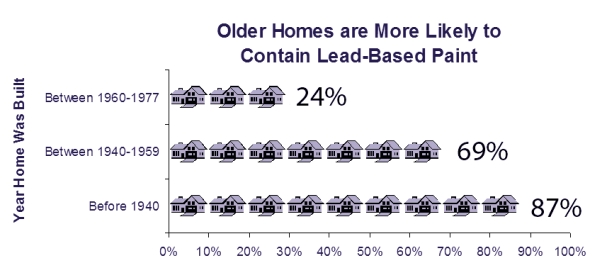Concerned About Lead in Burlington, Vt.?
Lead and the Buying/ Selling Process. Protecting You and Your Family.
There are a number of Vermont homes that were built or remodeled prior to 1978. Why 1978? In 1978, the federal government banned consumer uses of lead-containing paint, but some states banned it even earlier. Lead from paint, including lead-contaminated dust, is one of the most common causes of lead poisoning.
The exposure pathways for lead that is most concerning are ingestion and inhalation. Lead can effect anyone in a family, but children are at the greatest risk, due to developing nervous systems and smaller body mass. Small children also tend put everything in their mouths, which could include paint chips or chewing on windowsills. Lead actually has a sweet taste, which can encourage little ones to seek out places to chew when teething.
Physical Effects: Lead can cause damage to the brain and nervous system, behavior problems, slowed growth, headaches, difficulties during pregnancy, high blood pressure, digestive problems and muscle and joint pain.
Lead can exist in many forms, but home buyers and sellers are most concerned with paint. Flaking or deteriorating paint means that there is a possibility of lead in the air, in the home's dust, and in places accessible by children.

Source - US. EPA
As a Buyer/ Seller, what are your responsibilities?
- Sellers must disclose in writing any information about known lead paint in the home. If sellers have performed lead tests, they must share the test results.
- Sales contracts must give buyers up to 10 days to check for lead hazards. Home buyers aren't required to test for lead--but they must be given the opportunity to do so. You might see this information on a special addendum attached to a purchase contract.
Your realtor will provide your with federal and state information about protecting yourself and your family from lead exposure.
-
As a buyer, if you are buying a home that has deteriorating lead paint, you may negotiate with the seller to hire an EPA licensed contractor to safely remediate the deteriorating spots. There are numerous do-it-yourself options, but we always recommend consulting an expert.
We hope that this clears up some of the confusion about the hazards of lead, and why it will be part of the buying and selling process. As always, we are here to help.
The Matt Hurlburt Group. Expect More.





